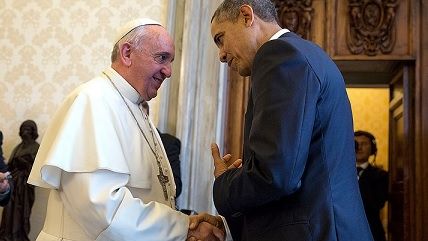The Left is All About Religion Influencing Public Policy—When It's For Bigger Government
Religion scizophrenia

Based on recent events, the emerging progressive consensus seems to hold that religious beliefs should be forbidden in the public square, except in those cases where they should be mandatory.
It has been a couple of weeks since Pope Francis released his encyclical about the environment, and liberals are just now recovering from their collective swoon. The organs of the left lavished it with praise, calling it everything from "authoritative" and "compelling" (The New York Times) to "powerful" and "revolutionary" (Salon). Humanity has sinned against the planet, they agree, and must take urgent, collective action to repair the damage.
Liberals took a decidedly less deferential tone when the craft-store chain Hobby Lobby sought a religious exemption from Obamacare's contraception mandate.
Corporations can't have religious beliefs, they said (ignoring the fact that thousands of incorporated entities, known as churches, clearly do). Even more emphatically, they insisted Hobby Lobby's owners wanted "to impose their religious views on employees" (The New York Times again, echoing countless others). This was histrionic nonsense, given that employees remained perfectly free to buy contraception on their own.
Moreover, progressives insisted that the owners of Hobby Lobby faced no burden on their faith because they could still worship as they chose when they went to church. That also is the argument regarding religious objections to gay marriage: Individuals who disapprove may do so within the four walls of their church, but they should not be allowed to act on their convictions outside church by, say, declining to bake a cake for a gay wedding.
A few have even suggested churches that oppose gay marriage should lose their tax-exempt status: "We'll let you practice your bigotry, at least within the confines of your own church," went a piece in Fusion. "But we're not about to reward you for doing so." Even the ACLU has dropped its support for the Religious Freedom Restoration Act because while "religious freedom needs protection," it should not be used "to impose one's views on others."
This is a pretty broad definition of "imposing." By similar reasoning, one might argue that a Christian bookstore is imposing its views if it prefers not to carry Playboy and Penthouse. (After all, the baker is not refusing to serve gay customers outright. She is refusing only to provide a certain message on a cake.)
But if we're going to accept that broad definition of "imposing," then we should not be taking orders about environmental policy from the pope. To be consistent, progressives should have responded to his encyclical by lecturing Catholics that religious arguments for environmental stewardship are fine in church, but not as a basis for public policy.
To be fair, let's also note that conservatives who applaud Roman Catholic teaching about homosexuality can hardly turn around and denounce the pope's views on the environment. If you accept the pope's authority in one realm, then you accept it in the rest — because the authority all derives from the same source.
Of course, Catholics aren't the only ones injecting religion into the public sphere.
A story last week in The Times-Dispatch reported on a meeting at the Jewish Community Center in Richmond, where a group of faith leaders had gathered "to press the case that the provision of health care for all Americans is a moral imperative."
Rabbi Gary Creditor stressed the importance of loving your neighbor as yourself. "In Judaism things can be either an option or an obligation," he said. "When we talk about the gap in medical coverage … it's not an option for society from a religious perspective to debate the question. It's an obligation upon society to fulfill it."
The Rev. Sidnee Dallas said Baptists believe the same: "God wants us to love and protect" everybody. Abu Qutubuddin of the Islamic Center of Virginia drew attention to the Islamic belief that health is a blessing from God. The Catholic Diocese's Emmanuel Carreno Garcia said Catholics "are called to respond to the needs of others."
No doubt they are. But where are they called upon to use the coercive power of the state to make non-Catholics join them? How do the individual religious obligations of Jews and Muslims translate into a collective duty for everybody else? Few religious leaders seem eager to answer that question.
If a Christian violates the boundary separating religion from secular society simply by passively declining to bake a cake, then surely she must trespass even further beyond it by insisting other people actively participate in her religious duty to help the poor (or save the planet). Yet progressivism condemns her in the first instance, and cheers her in the second.
That seems logically untenable. But from one angle, it looks perfectly consistent: Religious arguments receive approval when they support policies that restrict individual freedom. When it comes to the glory of big government, the left's faith is unshakable.
This column originally appeared at the Richmond Times-Dispatch.
